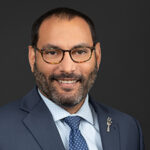A new report that predicts healthcare spending will increase at a higher rate in the coming years following its slower-than-average growth in 2013 should be of concern to rheumatologists, according to the chair of the ACR’s Government Affairs Committee.
William Harvey, MD, MSc, FACR, says that as spending increases again, Congressional lawmakers and federal policy makers looking to direct where the dollars are spent over the next decade may allocate more money to primary-care physicians and hospital-based practitioners and reserve a smaller slice of the pie for specialists.
“We are concerned that indications of future growth in spending mean that we will become targets once again,” says Dr. Harvey, clinical director of the Division of Rheumatology at Tufts Medical Center in Boston.
A report published in September 2014 in Health Affairs said that spending growth in 2013 fell to 3.6%, down from 7.2% annually on average between 1990 and 2008.1 The decreased rate was attributed to a “sluggish economic recovery, the effects of sequestration, and continued increases in private health insurance cost-sharing requirements,” according to the report.
However, the combination of money being pumped into healthcare reform and a growing economy is projected to push up spending by 5.6% this year and 6% annually each year from 2015 to 2023, according to the report.
Dr. Harvey fears rheumatology will be a cost-cutting target because care of chronic conditions accounts for the majority of Medicare spending. Couple that with the perception among some members of Congress and the public that specialists, including rheumatologists, are too highly paid for procedures, and there is reason to think the specialty will be inaccurately judged on methodologies that treat rheumatologists as proceduralists.
For example, Dr. Harvey points to programs and rules designed to increase the number of primary-care physicians and decrease the number of referrals to specialists. In turn, fewer specialist billings would reduce Medicare spending. But those savings are aimed more at costly procedures than the types of tasks performed by rheumatologists, he adds.
The ACR is working with the Centers for Medicare and Medicaid Services and representatives from various medical specialties to lobby lawmakers so that rheumatologists and other non-proceduralists will be judged on the actual services they provide.
“It doesn’t matter if you’re a specialist or a primary-care physician,” Dr. Harvey says. “What matters is how you care for patients and what services you’re billing for. That’s a much better way of drawing a line.” (posted 10/10/14)



